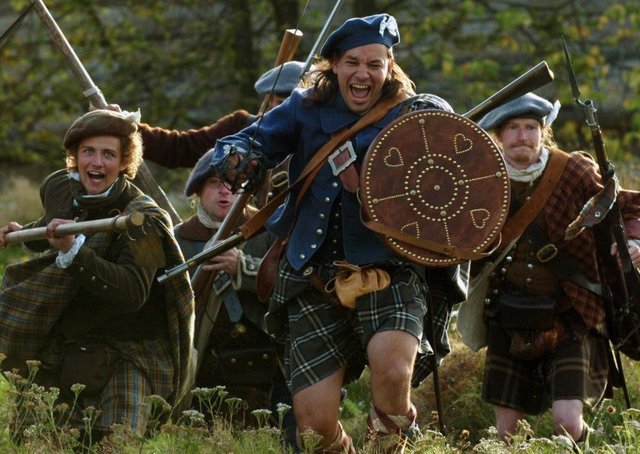How a Conscientious Objector Became a Scottish Jacobite

Professor Joe Goldblatt
Even today I can still smell the nasty, vile stench of burned out cigars burning in heavy glass ashtrays when I was interrogated by the members of the Vietnam war draft board in Dallas, Texas in 1970. During the Vietnam war when a young man in the USA turned 18 years old they were required to register for the military draft or alternatively seek an exemption. I chose to concientiously object to what I believed was an immoral, unethical and illegal war and this required a personal appearance in front of five much older men who constituted my local draft board.
The men who were members of my draft board that day proudly wore their combat medals and in one man wore his Veteran of Foreign Wars (VFW) uniform and they began to interrogate me about my beliefs about war. The chair withdrew his still smoking cigar, stubbed it out in the ashtray and then glared at me while exhaling enough smoke to kill a cat. In a low rumbling voice he asked “Are you afraid to defend your country?”
I was stunned by his question and once I recovered my senses I quietly said “No. I object to what I believe is an immoral, unethical, and illegal war.” The other men, and they were all men with the exception of one female stenographer who was taking shorthand notes in a spiral notepad, bristled in their chairs. The chair then asked them if there were any further questions.
The man who wore the VFW uniform turned to me and asked “I understand you are a Jew. Do you Jews not want to defend our country?” Once again I was surprised by his blatant ignorance.
I took a deep breath to try and calm my fast beating heart and responded by explaining that Jews have served in the U.S. military for many generations and indeed centuries. However, my religion was not the motivation for my decision to seek conscientious objector status. Rather, I did not wish to contribute to a war that I believed was simply wrong.
The draft board members told me to return to their office in a week to review and approve the transcript that had been recorded and then they would send me by post their decision. I returned to the office and met with the stenographer and to my astonishment I quickly discovered that she had misquoted my responses. I refused to sign the document until she reinstated my actual statements and although she was surprised and perturbed at my stubbornness, she finally allowed me to make the changes, while signing and dating each correction.
A few weeks later an official letter from the draft board was received at my home through registered mail. The letter stated that I had been granted conscientious objector status. I was surprised, however, also relieved. When I told my mother about my successful outcome, I was also surprised by her negative response. She was clearly disappointed that I had refused to, in her words “Serve my country.”
I explained that there were many ways in which citizens may serve their country and I would look forward to finding other opportunities to do this in the future. She was not impressed. However, my father’s reaction regarding my decision spoke volumes.
He never said a word to me about his feelings regarding my actions. This was surprising because Papa was a Sergeant Major in the US Army and received the Bronze Star for Valour. However, I remembered that during my childhood, like many men of his generation, he never once spoke of his experiences during the war. Therefore, I interpreted his lack of comment about my decision to become a conscientious objector as his tacit approval or perhaps his resignation that war was a horror that he was glad that I had avoided.
Fifty – seven years after my decision, I was invited to join the board of an organisation that celebrates the Battle of Prestonpans in 1745 and Jacobite Scotland. The aim of this organisation is to provide information, education, and promote experiences related to this historic battle When I accepted this invitation I thought that it was a bit incongruous that an American concientious objector would affiliate with an organization whose founding was based upon one of the most famouse of the Jacobite cause historic battles.
However, I believe that now that I have had over half a century to reflect upon my decision, and I have come to realise that war is indeed complex and the Battle of Prestonpans in 1745 was fought for a just and noble cause. I now welcome, the opportunity to in the twenty – first century, opportunities to celebrate and fight for just and noble causes. Providing factual information and education motivates me to fight for just and noble causes to preserve of history, illuminate valour and seek independence. To help advance this cause I recently became an official friend of the Bonnie Prince, the most famous Jacobite of them all, Charles Edward Stuart (1720 – 1788). I now invite you to join me in befriending the Bonnie Prince at https://isoiadigital.com/friends-of-prince/
After all, the more each of us learn about the motivations for war, perhaps the more we may do to prevent future battles from occurring. My future quest is just that. I wish to use social media and other forums to better understand and appreciate why men and women feel motivated to go into battle and to find ways through research and education to reduce the need for such actions in the future.
Professor Joe Goldblatt is a trustee of the Battle of Prestonpans 1745 trust and was a USA conscientious objector during the Vietnam war. To read more about his views visit www.joegoldblatt.scot

“misquoted your responses” – what a silly stenograoher. Loved this article, Professor G 🙌🏽
Thanks!